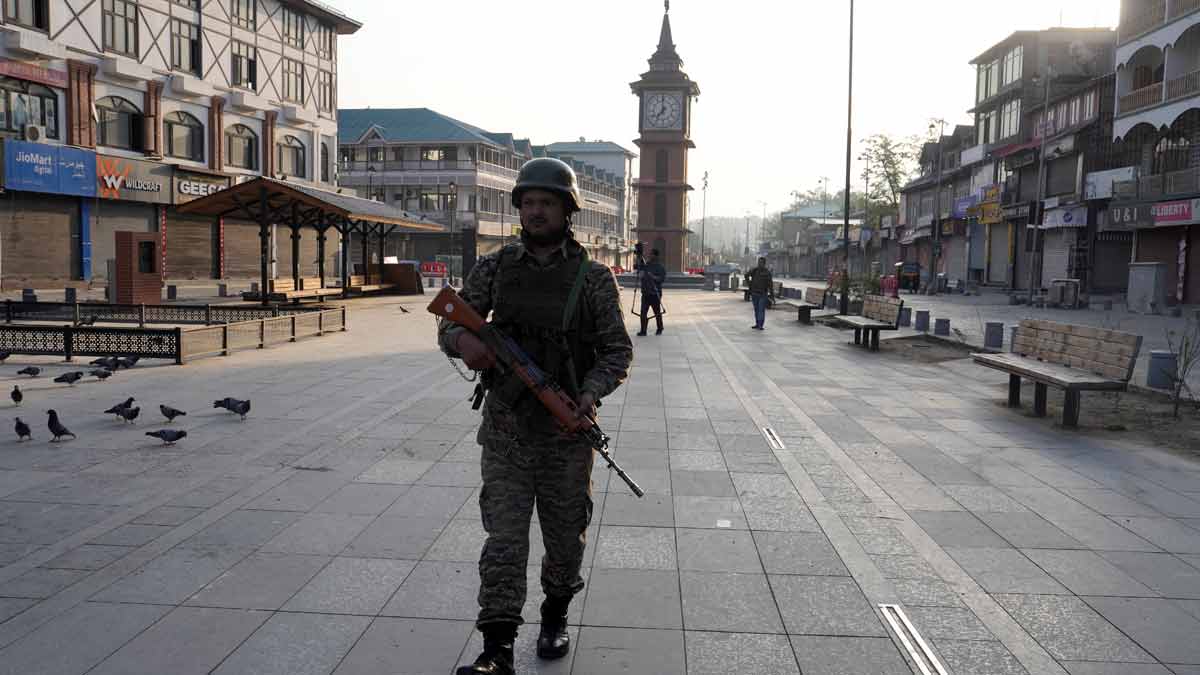India's diplomatic offensive: Exposing Pakistan's Role in Pahalgam terror attack
 Security personnel stand guard at Lal Chowk market in Srinagar during a strike call given by traders, transporters and other organisations against the Pahalgam terror attacks | PTI
Security personnel stand guard at Lal Chowk market in Srinagar during a strike call given by traders, transporters and other organisations against the Pahalgam terror attacks | PTI
Intelligence sources have attributed the devastating terror attack at a popular tourist destination near Pahalgam in Jammu and Kashmir, on April 22, 2025, to Pakistan's escalating strategic maneuvers that involved remote coordination of the attack from safehouses in Muzaffarabad and Karachi, infiltration of terrorists that were well-equipped, with automatic weapons including AK rifles and sophisticated communication devices, and above all the inflammatory speech of its army chief General Asim Munir, delivered just days prior.
India has been actively engaging with foreign governments, presenting a compelling case backed by technical intelligence, verified eyewitness accounts, and intelligence agency findings to establish the unequivocal Pakistani link to the Pahalgam terror attack. Prime Minister Narendra Modi has spoken with 13 world leaders and hosted high-level meetings in Delhi involving over 30 ambassadors, Foreign Secretary Vikram Misri, and senior MEA officials.
These interactions have been instrumental in briefing foreign leaders and envoys on the Pahalgam terrorist attack, underscoring its direct ties to Pakistan's ISI and military apparatus. This connection begins with The Resistance Front (TRF), which has claimed responsibility for the attack.
Indian intelligence agencies have identified TRF as an offshoot of LeT, with skilled operatives from Lashkar's core group. Saifullah Sajid Jutt, alias Saifullah Kasuri, a senior LeT commander, is identified as the mastermind behind the Pahalgam terrorist attack. Originating from Shangamanga village in Pakistan’s Punjab, Jutt operates from an LeT base in Islamabad and is classified as a 'hardcore terrorist' by the National Investigation Agency (NIA). TRF emerged in 2019 following the abrogation of Article 370 in J&K, to provide a localized face to militancy in Kashmir while avoiding scrutiny from international bodies like the Financial Action Task Force (FATF).
Agencies have uncovered digital traces linking the Pahalgam attackers to safehouses in Muzaffarabad and Karachi—key operational hubs for LeT. These hubs, reportedly overseen by the Pakistan Army and ISI through dedicated control centers, mirror the infrastructure utilised during the 26/11 Mumbai attacks.
Indian security forces have further identified multiple terror launch pads and training camps in Pakistan-occupied Kashmir (PoK), with an estimated 150–200 trained terrorists stationed at these camps, poised for infiltration across the J&K border. An estimated 60 foreign terrorists from Hizbul Mujahideen (HM), Jaish-e-Mohammed (JEM), and LeT are currently operating in J&K. To aid their efforts, Pakistan’s spy agency, ISI, has equipped these terrorists with the offline version of the Alpine Quest navigation app—commonly used by professional trekkers. It provides infiltrators with key details, such as the locations of Indian security force camps, police convoy routes, and barricades. The terrorists have been supplied with encrypted radio communication devices, with their servers reportedly based in Pakistan.
Eyewitness accounts from the Pahalgam terror attack have provided chilling details about the perpetrators. Survivors and investigators have reported that the attackers, heavily armed with AK-series rifles and advanced communication devices, were dressed in military-style uniforms, indicating a high level of training and coordination. Some eyewitnesses recounted that the terrorists targeted victims based on their religious identity, forcing them to reveal their names, recite Islamic verses, or show identification before executing them.
A more nuanced, yet explicit connection to the Pahalgam terror attack lies in the provocative speech delivered by Pakistan’s Army Chief General Asim Munir at the Overseas Pakistanis Convention in Islamabad, on April 17 in which he invoked the Two-Nation Theory. He stated that Pakistanis are "fundamentally different from Hindus in religion, culture, traditions, thoughts, and ambitions". He labelled Kashmir as Pakistan’s “jugular vein,” serving as a veiled endorsement of jihadist activities.
Munir’s speech—its timing, implications, and necessity appears to be a covert signal to Pakistani "assets" in Kashmir. This rhetoric, reminiscent of past calls for “jihad and bloodshed” by figures like LeT commander Abu Musa, aligns with the timing and nature of the attack, suggesting a deliberate signal to militant groups.
In the aftermath of the Pahalgam terror attack, while speaking with Sky News, Pakistan's Defense Minister, Khawaja Asif, inadvertently validated accusations against Pakistan regarding its support for terror groups. He admitted that Pakistan had supported and funded terrorist groups for decades, describing it as "dirty work" done for the United States and the West, including Britain. His statement is significant because it indirectly acknowledges Pakistan's historical role in fostering terrorism, even if framed as a mistake or external coercion.
Delhi has initiated a series of diplomatic countermeasures against Pakistan, from downgrading diplomatic ties by expelling Pakistani military advisors to suspending the Indus Waters Treaty. Critical border crossings, such as the Wagah-Attari route, have been closed to halt movement between the two nations. Visa restrictions have also been imposed, with all previously issued visas to Pakistani nationals revoked and the SAARC Visa Exemption Scheme suspended, requiring those currently in India under the scheme to leave within a specified timeframe.
While announcing these measures, Foreign Secretary Vikram Misri underscored the 'cross-border linkages' of the terrorist attack, further reinforcing the rationale behind India's diplomatic stance. On the global front, India is actively engaging with its international allies to isolate Pakistan diplomatically and garner support against terrorism. This strategic component of Delhi's coercive diplomacy aims to isolate Pakistan on the global stage and heighten international pressure.
Vaishali Basu Sharma is a security and economic affairs analyst
India